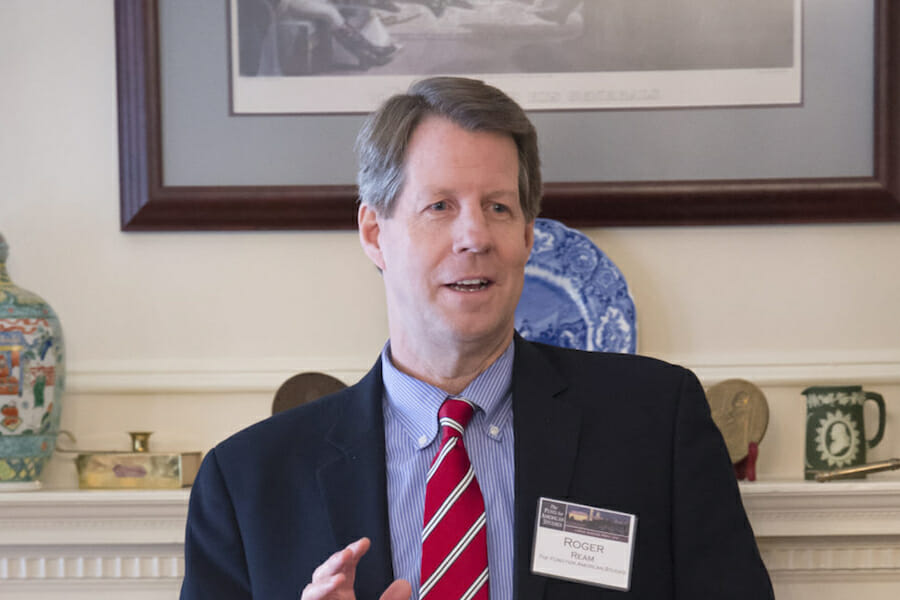
TFAS President Roger Ream Discusses 25 Years of the International Program
Shortly after the fall of the Berlin Wall, the Washington, D.C. based nonprofit, The Fund for American Studies (TFAS), began to pursue opportunities to promote and foster ideas of individual liberty abroad in places that had historically been closed off to the West. When the wall finally came down in 1989, TFAS began recruiting students from former Soviet Bloc countries to lay the foundation to build its international program.
In 1993, TFAS established the American Institute on Political and Economic Systems (AIPES) at Charles University in Prague. Since then, TFAS has expanded its international programs in all corners of the world, including Asia, the Balkans and Eastern Mediterranean, Africa, the Middle East and Latin America. We spoke with TFAS President Roger Ream during his visit to Prague to celebrate the 25th anniversary of the international program this week.
The fall of the Berlin Wall was an opportunity for TFAS. How did you reach students in the former Soviet Bloc countries and what was the response?
Beginning in 1989, TFAS provided scholarships to help students from former Warsaw Pact countries and the then still existing Soviet Union to attend our U.S. programs. The first two students came from the Baltics. This was in part because our long-time economics professor George Viksnins of Georgetown University, a Latvian-American, had good contacts in that region. By 1992 the number of applications was nearing 100. So we found a partner, Charles University in Prague, to work with us to develop a summer program there. Student interest was very strong, especially because there was a keen desire to learn about the U.S., both our political and economic systems, and our culture. I vividly remember a class discussion from 1993 when a student spoke eloquently about how Coca-Cola and other American products coming to her country of Romania served as a symbol of freedom to her, because these things were denied to her under communism.
How has the international program adapted to other political changes in different parts of the world?
TFAS established other international programs in Hong Kong and Santiago, Chile and there have been a number of changes to our programs over the years. The curriculum has become a bit less of an American studies focus and more of a review of ideas in political philosophy and economics applied to problems in the world today. For example, students in Hong Kong read John Stuart Mill’s On Liberty and discuss whether free speech was an absolute right or should be tempered by concerns about “hate speech” or threats to order in society.
In each program, we have tried to have some local focus. Hong Kong has the freest economy in the world, so we bring in local leaders from business, government and the nonprofit sector to talk about its success. Likewise, Chile is one of the freest and most successful economies in South America. It has a private retirement system that is contributing much to that success. We bring in the architect of that program, José Piñera, to explain how it works.
Many pundits point out that politics in the U.S. is in a state of relative incivility. You work with thousands of politically-aware students – what is the dynamic between all these young leaders, many from different backgrounds, who participate in TFAS programs around the world?
Incivility is a problem. In all of our TFAS programs, we put great emphasis on the importance of listening and being open to considering new ideas. This has helped ratchet down any tension that might exist when students are exposed to new or different ideas. The problem of incivility is most acute in our U.S. programs. Many students live in bubbles and are surprised when they encounter ideas that are different from those that dominate their campus or social circle. But by putting an emphasis on the search for truth and respect for difference, we mostly overcome that hostility. We don’t find foreign students to be as upset when they hear a viewpoint that is new or challenging.
What are the challenges of running an educational program that exists on four continents and has hosted students from over 100 countries? How do you overcome those challenges?
The major challenge is raising sufficient funds because the students who attend our program generally need scholarship support. We find some donors want to focus exclusively on the U.S., because we have our share of problems here that need to be addressed. Some of the more established international donors are less interested in funding programs abroad that have an admittedly pro-American or even more neutral edge to them. I recall a major foundation leader telling me “we only fund programs that help international students become more informed in their anti-America feelings.”
What are some alumni highlights from the international program you can share? Has anyone gone on from the international program that has made you especially proud of their contributions to politics, economics, or society at large?
Many of the alumni of our international programs are making a difference in the world. A graduate of our program in Prague – an American – is serving in the U.S. Congress. We’ve had alumni heading up central banks, serving as ministers in governments, becoming leading journalists, founding free-market think tanks, teaching at universities and working for major corporations. One of our alumni in Armenia was a leader of the recent uprising there and has been appointed national security advisor in the new government. Today, there are more than 17,000 TFAS alumni, representing 140+ countries, who are making a difference in their communities and throughout the world by upholding the values essential to the preservation and success of a free society.
